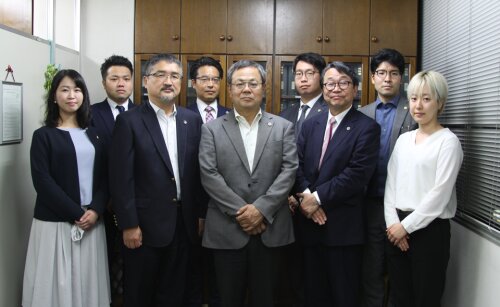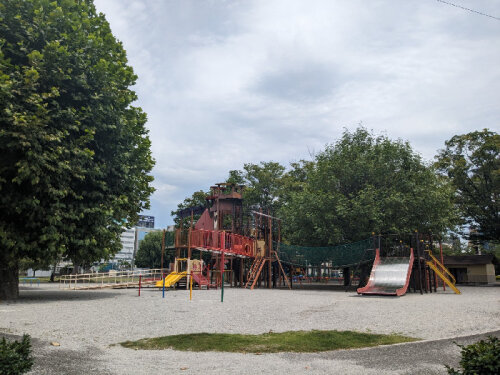Best Toxic Tort Lawyers in Shizuoka
Share your needs with us, get contacted by law firms.
Free. Takes 2 min.
List of the best lawyers in Shizuoka, Japan
About Toxic Tort Law in Shizuoka, Japan
Toxic torts involve injuries or losses caused by exposure to harmful substances such as industrial chemicals, heavy metals, asbestos, PCBs, pesticides, or air and water pollutants. In Shizuoka Prefecture, as elsewhere in Japan, toxic tort claims are typically pursued under civil tort law, product liability rules, administrative environmental law, and workplace health and safety law. Cases can arise from industrial accidents, chronic pollution from factories or waste sites, contaminated drinking water, occupational exposure, and legacy contamination of soil or buildings.
Resolving toxic tort matters usually requires a combination of medical evidence, environmental and scientific investigation, legal analysis of liability, and engagement with local and national regulatory authorities. Local government agencies in Shizuoka may investigate pollution complaints and require remediation or issue administrative orders. Civil lawsuits seek compensation for physical injury, medical costs, loss of income, pain and suffering, and in some cases remediation costs for contaminated property.
Why You May Need a Lawyer
Toxic torts are legally and technically complex. A lawyer with experience in environmental, product liability, occupational health, or personal injury law can help in multiple ways:
- Assess legal theories of responsibility - negligence, nuisance, strict product liability, breach of statutory duty, or employer liability.
- Coordinate scientific and medical experts to establish exposure and causation.
- Preserve and collect critical evidence - environmental samples, medical records, workplace records, maintenance logs, and corporate documents.
- Deal with administrative procedures - reporting to prefectural environmental offices, applying for inspections, or triggering local remediation mechanisms.
- Advise on statute of limitations and strategic timing for claims.
- Negotiate settlement with responsible parties - companies, insurers, or government bodies - or litigate in court if necessary.
- Advise on funding and fee arrangements - retainer, contingency or mixed-fee arrangements, and availability of legal aid for eligible claimants.
Local Laws Overview
Several legal regimes are relevant in Shizuoka and Japan generally:
- Civil Code - Tort Liability: Japanese Civil Code sets out the basic rule that a person who intentionally or negligently infringes another's rights or legally protected interests is obliged to compensate for damages. This is the core basis for toxic tort claims that seek damages for harm caused by pollution or exposure.
- Product Liability Act: The Product Liability Act imposes liability on manufacturers for damage caused by defective products, and can apply when a hazardous product or chemical causes harm. Under this act, plaintiffs do not need to prove negligence, but must show a defect, damage, and causal link to the product.
- Soil Contamination Countermeasures Law: This law requires investigation and remediation when soil contamination above statutory levels is detected. Local governments including Shizuoka Prefecture play a role in ordering investigations and cleanup.
- Environmental Laws and Regulations: National laws for air pollution control, water pollution prevention, waste management, and chemical substance controls create regulatory duties for businesses and provide mechanisms for inspections and remedial orders by prefectural authorities.
- Industrial Safety and Health Act and Labor Law: For occupational exposures, the Industrial Safety and Health Act and related Ministry of Health, Labour and Welfare guidance govern employer duties, exposure limits, monitoring, and compensation systems. Labor Standards Inspection Offices and workers compensation schemes may be involved.
- Administrative Remedies and Enforcement: Prefectural environmental and health offices can investigate pollution complaints, require emission controls or remediation, and issue fines or orders. These administrative steps can be crucial evidence in civil cases.
- Statute of Limitations: Under Japanese law, a tort claim is generally subject to a 3-year limitation from the day the injured person became aware of the damage and the identity of the tortfeasor, and an absolute limitation of 20 years from the date of the tortious act. Different deadlines may apply for claims against public entities or for certain statutory remedies, so prompt action is important.
- Group Claims and Collective Relief: Japan does not have the same broad class-action system found in some other countries. However, coordinated suits with representative plaintiffs, consolidation of cases, and actions supported by consumer organizations are used to handle multiple similar claims.
Frequently Asked Questions
What steps should I take first if I suspect toxic exposure?
Seek medical attention immediately and document medical diagnoses and treatment. Record where, when, and how the exposure likely occurred. Preserve physical evidence if possible - clothing, containers, or samples - and keep a detailed journal of symptoms, communications with employers or companies, and any tests or inspections by authorities.
How do I prove that exposure caused my illness?
Proving causation often requires medical records, expert medical opinions, and scientific or environmental testing showing the presence and level of the hazardous substance. Epidemiological studies, workplace exposure records, maintenance logs, and evidence of regulatory violations strengthen causation claims. A qualified lawyer will help identify and retain appropriate experts.
Who can be held responsible for toxic contamination?
Potentially liable parties include the operator of a facility that released the substance, manufacturers and distributors of defective products, property owners who allowed contamination to persist, and employers for workplace exposures. Liability can be based on negligence, nuisance, strict product liability, statutory breaches, or employer duty violations.
What kinds of compensation can I obtain?
Compensation may cover medical expenses, future medical care, lost wages, reduced earning capacity, pain and suffering, emotional distress, and property decontamination or diminution in property value. In rare cases punitive-like damages may be considered, but Japanese courts typically focus on compensatory relief.
How long do toxic tort cases take to resolve?
Duration varies widely. Some cases settle in months if liability is clear and parties negotiate. Complex cases with scientific disputes, multiple plaintiffs, or long-term health effects can take several years to litigate and resolve. Administrative cleanups and remediation can also take years.
Can I bring a group lawsuit with other victims?
Yes, group litigation is possible and often practical for large-scale contamination. Japan lacks broad class-action procedures, but multiple plaintiffs can coordinate suits, use representative plaintiffs, or have consumer organizations assist. A lawyer can advise on the best format for collective action in the specific circumstances.
What role do Shizuoka prefectural authorities play?
Shizuoka Prefecture can investigate pollution complaints, order tests, require remediation, and enforce environmental regulations. Prefectural and municipal public health centers may conduct health checks and provide guidance. Administrative findings and orders can be important evidence in civil claims.
Will I face criminal proceedings against the polluter?
Civil claims for damages are separate from criminal prosecution. In severe cases, criminal charges for regulatory violations or negligence may be brought by prosecutors. Victims can report offenses to police or relevant administrative agencies, which may trigger criminal investigations, but criminal results are not guaranteed.
What if the responsible company no longer exists or is insolvent?
If a responsible party is bankrupt or has dissolved, recovery can be difficult. Potential alternatives include identifying other responsible entities in the supply chain, insurers, or public compensation schemes if applicable. In some cases, public remediation obligations under environmental laws may still apply to landowners or successors.
How do I find and choose a lawyer in Shizuoka for a toxic tort case?
Look for a lawyer with experience in environmental law, product liability, occupational health claims, or personal injury litigation. Ask about prior cases, use of scientific experts, local knowledge of Shizuoka administrative processes, fee structures, and client references. The Shizuoka Bar Association or national legal support centers can provide referrals and information about legal aid eligibility.
Additional Resources
Below are types of organizations and agencies that can provide information, support, or referrals:
- Shizuoka Prefectural Government - Environmental Policy Department and local environmental and health offices for reporting pollution, requesting inspections, and learning about remediation measures.
- Municipal Public Health Centers in Shizuoka Prefecture - offer health consultations, exposure assessments, and local public health information.
- Ministry of the Environment (Kankyo-sho) - national standards, pollutant guidance, and policy on soil, water, and air contamination.
- Ministry of Health, Labour and Welfare (MHLW) - occupational exposure standards, workplace health regulations, and workers compensation information.
- Japan Legal Support Center - national legal aid organization that explains legal aid eligibility and referral processes.
- Shizuoka Bar Association - for lawyer referrals, consultation programs, and finding attorneys with environmental or personal injury experience.
- Consumer Affairs Agency - resources on consumer protection, product safety, and collective redress mechanisms.
- Labor Standards Inspection Office and Shizuoka Labour Bureau - for workplace exposure complaints, inspections, and employer duty enforcement.
- Local citizen groups and environmental NGOs - often provide practical guidance, community organizing, and experience in local pollution incidents.
Next Steps
If you believe you have a toxic tort claim in Shizuoka, consider the following practical sequence:
- Get medical care and keep all records. A clear medical record is foundational.
- Document everything - dates, locations, witnesses, symptoms, communications, photographs, and any physical evidence.
- Report the incident to the appropriate local authorities - municipal public health center, Shizuoka Prefectural environmental office, or labor authorities if it is a workplace issue.
- Contact a qualified lawyer experienced in toxic torts and environmental litigation to evaluate your case. Ask about fee arrangements, likely costs, and case strategy.
- If advised, arrange for environmental and medical expert evaluation through your lawyer to establish exposure and causation.
- Discuss administrative remedies and whether an administrative complaint or request for remedial action by the prefecture should be filed in parallel with civil claims.
- Consider joining or organizing with other affected people to share investigation costs and strengthen negotiation or litigation leverage.
Acting promptly preserves evidence and statutory rights. A lawyer can help prioritize steps, navigate local authorities in Shizuoka, and build a legally and scientifically supported case tailored to your situation.
Lawzana helps you find the best lawyers and law firms in Shizuoka through a curated and pre-screened list of qualified legal professionals. Our platform offers rankings and detailed profiles of attorneys and law firms, allowing you to compare based on practice areas, including Toxic Tort, experience, and client feedback.
Each profile includes a description of the firm's areas of practice, client reviews, team members and partners, year of establishment, spoken languages, office locations, contact information, social media presence, and any published articles or resources. Most firms on our platform speak English and are experienced in both local and international legal matters.
Get a quote from top-rated law firms in Shizuoka, Japan — quickly, securely, and without unnecessary hassle.
Disclaimer:
The information provided on this page is for general informational purposes only and does not constitute legal advice. While we strive to ensure the accuracy and relevance of the content, legal information may change over time, and interpretations of the law can vary. You should always consult with a qualified legal professional for advice specific to your situation.
We disclaim all liability for actions taken or not taken based on the content of this page. If you believe any information is incorrect or outdated, please contact us, and we will review and update it where appropriate.











